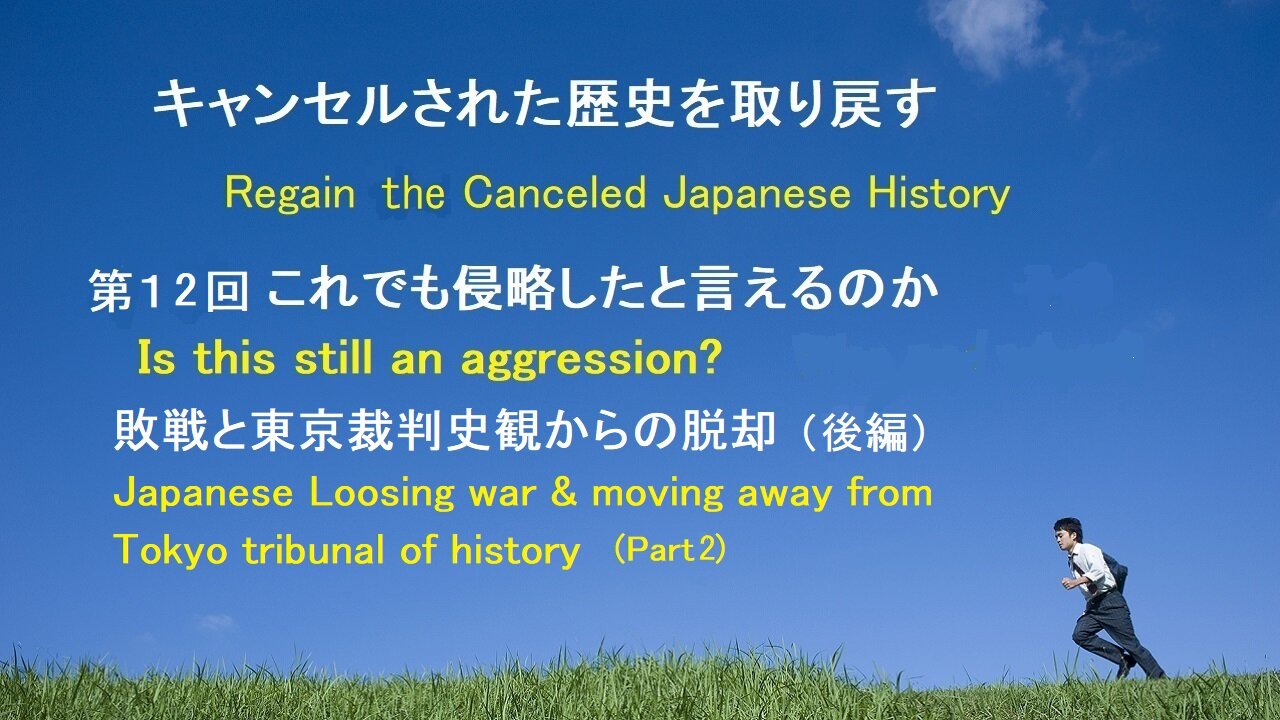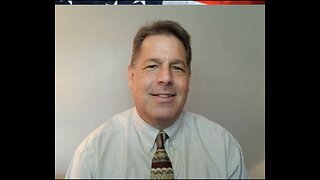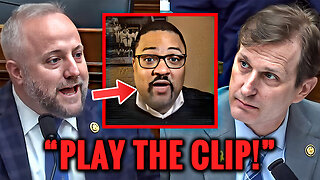Premium Only Content

"Japanese loosing war & Moving away from Tokyo tribunal of history" (Part 2)
It is said that Professor Emeritus Keiichiro Kobori of the University of Tokyo was the first person to use the term "Tokyo Tribunal History View". The crimes against peace and crimes against humanity were clearly ex post facto laws that did not exist when the Potsdam Declaration was issued. It is a major principle of modern law that a person cannot be judged by a law made after the fact. For this reason alone, the Tokyo Trials were a trial that ignored the law and could not be called a trial.
Why can't our government completely deny the Tokyo Tribunal even now, 76 years after its defeat? This is the homepage of the Ministry of Foreign Affairs. The Tokyo Tribunal was established by the Allied Powers after the war to try Japanese nationals for serious war crimes. 28 people were indicted for crimes against peace and humanity, and 25 were convicted except for those who died of illness or were exonerated.
We are aware that there is a lot of controversy about this tribunal, but Japan has accepted the tribunal of the International Military Tribunal for the Far East in accordance with Article 11 of the San Francisco Peace Treaty, and we believe that we are not in a position to object to this tribunal in our relations with other countries. This is the official position of our government. "Serious war criminals" is the enemy's word, but they are using it as is. The only saving grace is the inclusion of the phrase "there are various arguments.
In the past, there was a question in the Diet as to whether Japan had accepted the trials of the Far Eastern Military Tribunal and other trials by the military courts of the various Allied countries, or whether it had accepted the judgments and the effects of trials. If it is interpreted as accepting the judgments and the effects of trials, then it means that Japan does not accept the content and legitimacy of the Tokyo Trials, but it does accept the judgments and the effects of trials.
In response to this, the government's position on June 16, 2006, was that Japan had accepted the trial. The website of the Ministry of Foreign Affairs is also written based on this view. Therefore, even after 76 years, the government still cannot deny the legitimacy of the Tokyo Trials. This is the shackles that Britain, the United States, China and the Soviet Union have placed on Japan. Again, everything about postwar Japan is built from this. The Japanese Constitution is one of them.
This is also the true meaning of the statement on the Ministry of Foreign Affairs' website regarding the Marukin Incident, "We believe that it cannot be denied that there was. At the Tokyo Trials, General Matsui was found guilty and hanged for the Marukin Incident, which was designed to hold General Matsui Iwane accountable. This is because denying the Tokyo Trials would mean that General Matsui was falsely accused. The Japanese Constitution, drafted by GHQ, is also a byproduct of the Tokyo Trials.
At present, national public officials and police officers are required by law to sign and seal a written oath that they will abide by the Constitution of Japan. So, is it not possible for the government and the people of Japan to deny the Tokyo Trials forever and get rid of the historical view of the Tokyo Trials? Neither the Japanese government nor the Japanese people have simply kept being patient and enduring. for 76 years.
In 1952, 1952, the year of the San Francisco Peace Treaty's entry into force, waiting for independence on April 28, the following year, the Diet unanimously passed a resolution pardon request regarding the pardon of prisoners for war crimes, including the Communist Party. Also, Aoi Shigemitsu, who was Minister of Foreign Affairs when Tojo was Prime Minister, was declared a Class A war criminal, but later won election to the House of Representatives and gave a speech at the United Nations. Hideki Tojo's wife, Mrs. Katsuko, continued to live in the government office building in Yoga, where the former prime minister lived, and was paid a salary.
It seems that both the Diet and the government at that time did what they could even if they could not pardon him. In addition, in 2015, Abe's speech, which was released after a cabinet decision on August 14, 2015, he expressed his determination that our children, grandchildren, and the children of generations to come should not be destined to continue to apologize, and our people have decided to abandon the atonement for that war.
As you can see, the Constitution of Japan and other shackles that have been placed on post-war Japan are being removed little by little, though at a cattle pace. There is also the problem of an independent constitution, which has not been established even after 76 years, but public opinion polls clearly show that there is a growing momentum to move forward by revising the current constitution.
I would like to pass on the story of the Greater East Asia War, to our children and grandchildren with pride which our fathers, grandfathers, and great-grandfathers fought in. That's all for now. Good-bye, everyone.
-
 LIVE
LIVE
LFA TV
13 hours agoLFA TV ALL DAY STREAM - WEDNESDAY 8/6/25
4,971 watching -
 1:33:10
1:33:10
Chicks On The Right
4 hours agoCandace goes after Megyn, Big Balls attacked, Trump on the roof, & Liz goes full socialist
14.9K14 -
 4:03:39
4:03:39
The Bubba Army
1 day agoDiddy Asks Trump For Pardon- Bubba the Love Sponge® Show | 8/06/25
45.3K6 -
 1:09:17
1:09:17
Greg Hunter's USAWatchdog.com
11 hours agoMan has No Control Over Black Star Black Swan – Weston Warren
13.5K16 -
 55:44
55:44
Game On!
18 hours ago $0.61 earnedCJ Stroud's MAKE or BREAK Season with the Texans?
12.8K1 -
 47:58
47:58
BlaireWhite
20 hours agoEpstein Survivor Interview: Exposing Everyone and Everything
22.7K36 -
 21:56
21:56
Producer Michael
21 hours agoI JUST BOUGHT $1,000,000 OF NEW CARS!
18.5K8 -
 2:56
2:56
Blackstone Griddles
15 hours agoHow to Clean your Blackstone Griddle with Bruce Mitchell
24.9K5 -
 8:07
8:07
Freedom Frontline
16 hours agoDan Goldman Just Got EXPOSED With ONE Video He Wasn’t Ready For
17.4K6 -
 2:03:21
2:03:21
BEK TV
1 day agoTrent Loos in the Morning - 8/06/2025
23.2K1